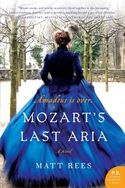
 Who do you think Mozart really was? In MOZART’S LAST ARIA, my new historical crime novel about the great composer’s death, I counter the idea that he was a buffoon who somehow wrote sublime music. That perception turns out to have been based on snobbish appraisals by Viennese aristocrats who thought Mozart ill-bred. But it was cemented in the public imagination by Amadeus
Who do you think Mozart really was? In MOZART’S LAST ARIA, my new historical crime novel about the great composer’s death, I counter the idea that he was a buffoon who somehow wrote sublime music. That perception turns out to have been based on snobbish appraisals by Viennese aristocrats who thought Mozart ill-bred. But it was cemented in the public imagination by Amadeus
, Peter Shaffer’s stage play which was directed so successfully for the cinema by Milos Forman in 1984.
Mozart was far more complex, intelligent and liberal than he has been given credit for. For a crime novel set in an autocratic police state, all of those elements of his character are very useful — because they put him in such danger.
So I based the novel around the investigation by his older sister Nannerl into the risks Wolfgang took. Ultimately she (and we) gets a much deeper understanding of Mozart and his music than previous fictional portrayals allowed us.
To be sure, Wolfgang was excitable and silly after musical performances. But The Rolling Stones have been known to drop television sets out of tenth-floor hotel rooms to let off steam and they’re no Mozart. Wolfgang’s letters and his friends’ recollections show that he was a deep thinker who had great admiration for Enlightenment ideals. That would’ve put him in jeopardy from the Emperor’s spies. I hope my novel will help rescue his reputation as an intellectual whose concern for his fellow man was rooted in a profoundly caring, warm personality.
Mozart, in fact, told his wife that his intellectual life had endangered him. Six weeks before he died, he was promenading in the Prater Gardens of Vienna with Constanze, to whom he was married for the last nine years of his short life. He told her he had been poisoned, that he was to be sacrificed, and knew he would die.
Recent historical research gave me the opportunity to have sister Nannerl investigate several causes of Wolfgang’s death that they’re more likely than the jealousy of Court Composer Salieri (who was the guilty party in Amadeus.) The new research shows that Mozart may have been involved in espionage involving Vienna’s Prussian enemies. In his last great opera, The Magic Flute, he espoused a provocative reinterpretation of Masonic regulations which could’ve put him in trouble with Freemasons and the Emperor (who had banned the Masons). And his interest in the ideas of the Enlightenment put him in the same intellectual sphere as the French Revolutionaries who were, at the time of his death, preparing to execute Marie Antoinette —— who happened to be the sister of the Austrian Emperor. Not a smart move, Wolfgang…
Of course, to find out which of these — if any — turns out to be behind his murder, you’ll have to read the book. But I hope it’ll make you look with a new eye at the great man and his music, through the eyes of the sister who loved him.
To comment on Matt Rees’s blog please click here.


One Comment
Mozart’s brains and Caravaggio’s balls | The Man of Twists and Turns